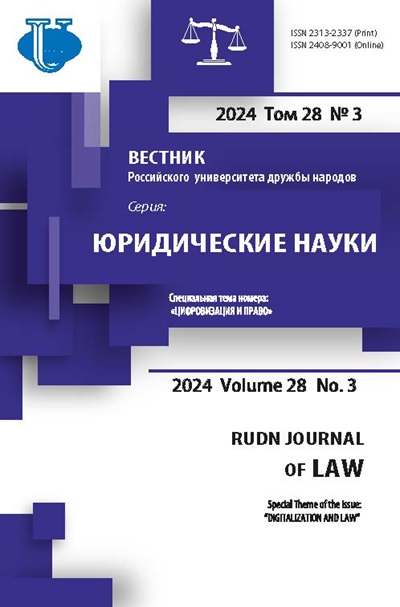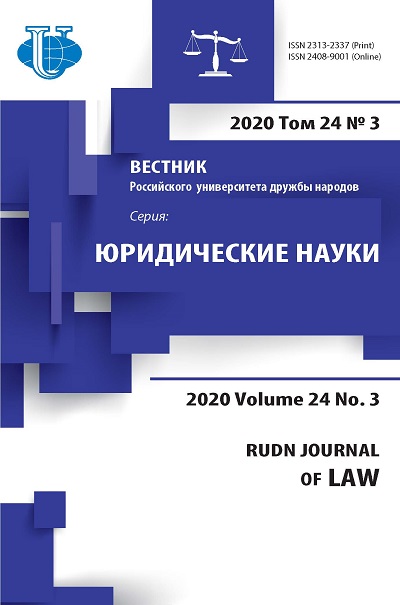ЗАКОНОДАТЕЛЬНЫЕ И ДОКТРИНАЛЬНЫЕ ПОДХОДЫ К ОПРЕДЕЛЕНИЮ КОРРУПЦИИ
- Авторы: Прошунин М.М.1, Кумуков М.Ш.2
-
Учреждения:
- Российский университет дружбы народов
- Российский государственный университет правосудия
- Выпуск: Том 24, № 3 (2020)
- Страницы: 497-512
- Раздел: ГОСУДАРСТВО И ПРАВО В СОВРЕМЕННОМ МИРЕ
- URL: https://journals.rudn.ru/law/article/view/24558
- DOI: https://doi.org/10.22363/2313-2337-2020-24-3-497-512
Цитировать
Полный текст
Аннотация
В юридической литературе наблюдается многообразие подходов к определению коррупции, что объясняется сложностью изучаемого явления. В статье рассматриваются различные подходы к определению коррупции, принятые в законодательных актах и теории. Затронута проблематика смысловой идентичности различных по форме определений коррупции, предложена методика отсеивания схожих по смыслу определений коррупции. Авторы также предлагают учитывать социальные и психологические аспекты в определении коррупции, так как они, с точки зрения авторов, являются неотъемлемой частью коррупции.
Ключевые слова
Полный текст
Реферат Коррупция, а также стратегии противодействия данному явлению, занимают умы исследователей на протяжении многих лет, однако в последние десятилетия данная тема все чаще становится предметом дискуссий не только среди представителей научных кругов, но также вызывает интерес у рядовых обывателей. Таким образом, коррупция представляет собой многогранное явление, ущерб от которого ощущается в различных сферах жизни общества. В юридической литературе наблюдается многообразие подходов к определению коррупции, что объясняется сложностью и изучаемого явления. Как показывает анализ подходов к определению коррупции, рассматриваемый феномен изучается в рамках различных наук, что говорит о междисциплинарном характере исследований в данной области. Так, в экономической теории распространенным является подход, описывающий коррупцию как форму рентоориентированного поведения. Изучение коррупции с точки зрения различных научных дисциплин не меняет того обстоятельства, что в силу разнообразия форм проявления коррупции, участников коррупционных схем и негативных последствий коррупции невыполнимой представляется задача выработки всеобъемлющего определения коррупции, которое бы учитывало все грани данного явления. Приходится констатировать, что при формировании дефиниции коррупции исследователь вынужден акцентировать внимание на одних особенностях коррупции в ущерб другим. В частности, юридические подходы к определению коррупции, как правило, не учитывают психологические, социальные, экономические аспекты коррупции. В силу особенностей юридической науки, исследование определенного явления, в том числе коррупции, требует анализа не только теоретических подходов, но и изучение нормативных источников в целях определения смысла, который закладывается в предмет изучения законодателем. Анализ нормативно-правовых источников свидетельствует о том, что дефиниция коррупции как на международном уровне, так и на уровне национальных правовых систем зачастую отсутствует. При этом можно прийти к заключению, что коррупция не сводится к даче и получению взятки должностному лицу. Так, в число субъектов коррупции включены представители частного сектора, которые нарушают законодательство не только когда подкупают публичных должностных лиц, но и при подкупе представителей коммерческих структур. Значительно расширено само понятие подкупа, которое отныне не лимитируется предоставлением денежных средств, но и включает в себя различные иные блага, в том числе неимущественного характера. Вовлечение различных форм проявления коррупции в орбиту системы противодействия коррупции представляется важным, так как данный подход позволяет противодействовать этому явлению комплексно, что, с учетом сложного структурного состава изучаемого явления, полагаем необходимым. Довольно разнообразными являются подходы к определению коррупции, принятые в юридическом научном сообществе. При этом сравнительный анализ свидетельствует о том, что большинство подходов к определению коррупции строится на описании взаимодействия трех базовых категорий коррупции: субъектный состав; вознаграждение, которое получает коррупционер; противозаконные действия, которые необходимо совершить в целях получения вознаграждения. Кратко коснемся вопроса вознаграждения, которое получает коррупционер за совершение противозаконных действий в целях получения данного вознаграждения. Исследователи зачастую выделяют также формы «мягкой» коррупции, когда вознаграждение представляет собой некоторое неосязаемое благо: отдых, продвижение по службе, протекционизм и многие другие. Отметим, что некоторые авторы полагают необходимым не учитывать обозначенные «мягкие» формы коррупции, так как это зачастую не целесообразно. С данной позицией, с нашей точки зрения, нельзя согласиться, так как неосязаемые формы коррупции могут служить мощным стимулом для злоупотребления должностными полномочиями. Встречаются также и громоздкие дефиниции коррупции, построенные на попытке перечисления условий возникновения данного явления, форм проявления и способов противодействия. Данный подход представляется не вполне обоснованным, так как перечисление форм проявления коррупции и условий зарождения данного явления не кажется возможным. Представляется целесообразным построение дефиниции коррупции на разнообразии форм ее проявления. Вместе с тем в определении коррупции, на наш взгляд, помимо учета ее базовых вышеуказанных категорий (субъектный состав; вознаграждение, которое получает коррупционер; противозаконные действия, которые необходимо совершить в целях получения вознаграждения) важно учесть психологический и социальный аспекты коррупции. Психологический аспект важен, так как коррупция является не только получением и дачей взятки (или иных благ), но также и действиями по минимизации риска быть пойманным, в том числе при реализации процедур финансового мониторинга. Стремление обезопасить себя при совершении коррупционных действий является неотъемлемой частью коррупции на всех его этапах от момента получения до момента использования имущества, вшито в природу данного явления. Принятие во внимание социального аспекта также важно с точки зрения целей противодействия коррупции, так как в конечном итоге коррупция негативно влияет на социальную жизнь общества. С учетом изложенного коррупцию можно определить как умышленные антиобщественные действия, совершаемые представителем публичной власти или частного сектора и выражающиеся в незаконном использовании служебного положения в целях получения имущественных и неимущественных выгод, либо предоставление таких выгод.
Об авторах
Максим Михайлович Прошунин
Российский университет дружбы народов
Автор, ответственный за переписку.
Email: mproshunin@mail.ru
доктор юридических наук, профессор, профессор кафедры административного и финансового права, юридический институт, Российский университет дружбы народов; профессор кафедры финансового права, Российский государственный университет правосудия
117198, г. Москва, Российская Федерация, ул. Миклухо-Маклая, д. 6Мурат Шахимович Кумуков
Российский государственный университет правосудия
Email: Kumukov.murat@yandex.ru
докторант
117418, г. Москва, Российская Федерация, ул. Новочеремушкинская, д. 69aСписок литературы
- Андриченко Л.В., Цирин А.М. Правовые инновации в сфере противодействия коррупции: материалы Первого Евразийского антикоррупционного форума и VII международной школы-практикума молодых ученых-юристов (Москва, 30-31 мая 2012 г.). М.: Институт законодательства и сравнительного правоведения при Правительстве РФ; Юридическая фирма «Контракт», 2012 г. 656 c
- Батяева А.Р., Матушкин А.В., Прошунин М.М. Финансовый мониторинг и коррупция: правовая взаимосвязь // Вестник Российского университета дружбы народов. Серия: Юридические науки. 2009. № 3. С. 19-27
- Беркович М.И., Духанина Л.Н., Максименко А.А., Надуткина И.Э. Восприятие коррупции как социально-экономического феномена населением региона: структурный аспект / Экономические и социальные перемены: факты, тенденции, прогноз. 2019. Т. 12. № 2. С. 161-178. doi: 10.15838/esc.2019.2.62.10
- Чиннова М.В. Дефиниции и их использование в нормативно-правовых актах, Автореферат диссертации на соискание ученой степени кандидата юридических наук. Москва. 2004. 24 с
- Криминализация экономики и экономическая безопасность России: учебник / Н.В. Артемьев и др.; отв. ред. В.И. Долинко. М.: Академия управления МВД России, 2018. 261 с
- Farrales, M.J. (2005) What is Corruption? A History of Corruption Studies and the Great Definitions Debate. University of California, San Diego. This Version: June 8, 2005, available at: http://ssrn.com/abstract=1739962
- Генетика // Философский словарь / Под редакцией И.Т. Фролова. 7-е издание, переработанное и дополненное. М.: Республика, 2001. 720 с
- Коррупция: природа, проявления, противодействие. Монография / отв. ред. академик РАН Т.Я. Хабриева. М.: ИД «Юриспруденция», 2014. 688 с
- Комаров В. Ф., Морозова Н. А. Рента как сверхприбыль, как доход арендного типа и как коррупционный доход // Мир экономики и управления. 2016. Т. 16, № 3. С. 68-83
- Кузнецова Н.Ф. Коррупция в системе уголовных преступлений // Вестник МГУ. Сер. 11. 1993. № 1. С. 66-83
- Martin, A. (2011) Implementation as the Best Way to Tackle Corruption: A Study of the UNCAC and the AUC 2003. Surrey Law Working Paper. No. 07/2011. 5, available at: https://papers.ssrn.com/sol3/papers.cfm?abstract_id=1776025 (Accessed 04 January 2020)
- Rauscher, M., Willert, B. (2019) Slavery, Corruption, and Institutions. CESifo Working Paper. No. 7944, available at: https://ssrn.com/abstract=3490408
- Соколов А.В. Противодействие коррупции в сфере управления федеральным имуществом: Дисс. канд. юрид. наук, М. 2012. 170 с
- Государственная политика противодействия коррупции и теневой экономике в России. Монография в 2-х томах. Т. 1 / Сулашкин С.С., Максимов С.В., Ахметзянова И.Р. и др. М.: Научный эксперт, 2008. 464 с
- Участие институтов гражданского общества в борьбе с коррупцией: научнопрактическое пособие / Т.А. Едкова, О.А. Иванюк, Ю.А. Тихомиров и др.; отв. ред. Ю.А. Тихомиров. М.: Институт законодательства и сравнительного правоведения при Правительстве Российской Федерации / ООО «ПОЛИГРАФ-ПЛЮС»; 2013. 160 с
- Тимофеев Л.М. Институциональная коррупция: очерки теории. Изд-во РГГУ, М. 2000. 363 с
- Правовые механизмы имплементации антикоррупционных конвенций: монография / Т.Я. Хабриева, О.И. Тиунов, В.П. Кашепов и др.; отв. ред. О.И. Тиунов. М.: Институт законодательства и сравнительного правоведения при Правительстве Российской Федерации, ИД «Юриспруденция», 2012. 288 с
- Уголовное законодательство зарубежных государств в борьбе с коррупцией / Ин-т законодательства и сравнит. правоведения при Правительстве Российской Федерации; авт. колл.: Власов И.С., Голованова Н.А., Кубанцев С.П. и др.; под ред. И.С. Власова. М.: Эксмо, 2009. 208 с
- Warburton, J. (2001) Corruption as a social process: from dyads to networks. Corruption and anticorruption, editors P. Larmour, N. Wolanin. 221-237. doi: 10.22459/CAC.03.2013.13
















